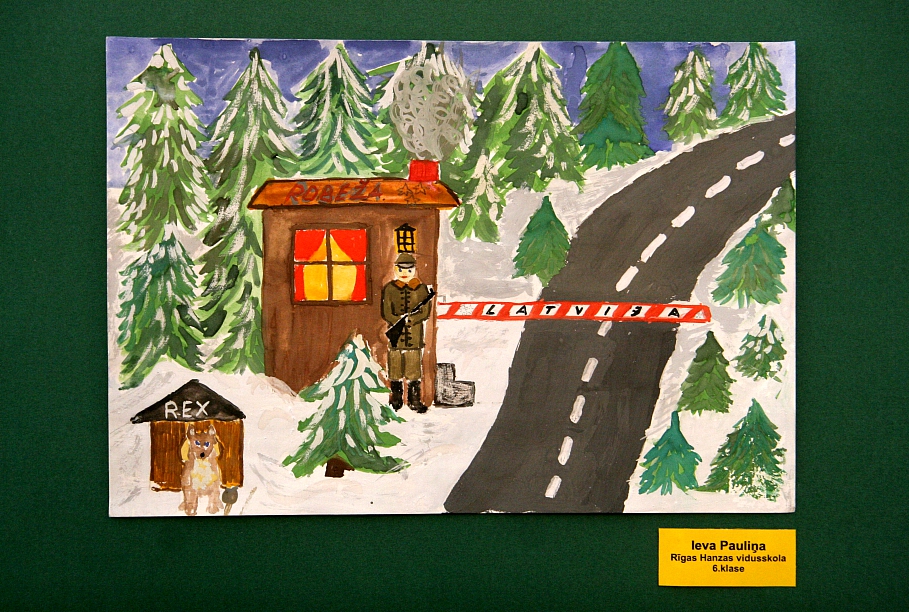The cabinet member responsible for the armed services is convinced that significant upgrades in more modern technology and an increase in the number of soldiers and border guard officers is imperative.
However the head-of-state, President Andris Bērziņš did not support the Defense Minister’s idea while Prime Minister Laimdota Straujuma said the proposal was still debatable.
Vejonis' recent regular and frequent visits to Latgale province should not be seen as any sort of risk factor or signal of possible threats, he said.
“The risk of military threat is low but at the same time we must strengthen our own external and internal security, that means we must develop the NBS, the Border Guard and make cooperation with NATO member-states,” he said.
Latvia’s eastern border plays an essential role in the EU’s external security concerns, too. The Border Guard is the first-instance state service to be responsible for the integrity and defense of the national territory.
Border Guard chief Normunds Garbars told LRT that the issue of clearing and erecting a 12-meter broad security swath along the entire Latvian-Russian border remains a real prospect, “and I hope we’ll be able to see it through,” he said.
Vējonis on his part stressed that he wished to see by 2018 “an increase of the army by two thousand persons, the Home Guard from the current eight thousand to some twelve or thirteen thousand. And of course, we must strengthen the Border Guard.”
While the Defense minister’s visit continues Friday, Interior Minister Rihards Kozlovskis meanwhile outlined the government’s plan Thursday to buy out around 300 separate private properties along the border zones affected by the proposed security swath.
“I have little reason for concern though we can’t rule out individual cases, but we’ve got 278 already agreed, and there’s no talk of putting anybody out of house and home here,” Kozlovskis told Latvian Television news Panorāma.
“But the border is just in critical condition. Most of the Border Guards can’t afford to look over the border toward Russia, they need to look down to make sure they don’t fall into some swampy ditch or fall off the rotten bridge,” said the Interior Minister.
Estonia has begun a similar plan to buy up border territory following the snatching of security agent Eston Kohver by Russsia last October from a disputed location on the border.
Meanwhile, residents of this northeastern corner of Latgale in the parish of Baltinava live in a tranquil and sparsely populated part of the land.
The district has a 27.8-kilometer borderline with Russia. Almost all the land along it belongs to private owners. “About every 200-300 meters there’s another property line. Only along the railroad is there a reserve of state-owned land,” explained Baltinava district council chair Lidija Siliņa.
The land along the border zones gets leased out for agricultural purposes. Most of the larger farms here grow grains on about 84% of the arable land. Though there are plenty of property owners, only few of them actually reside out here.
“There’s only one house in this area that’s got people living in it, at the second and third ones they’re all gone, half of them died off, the rest traveled away,” said Juris, who lives three kilometers from the border.
Staņislavs adds: “There were about 18 homesteaders once, now there aren’t any. Some still keep their properties, here and there somebody sells it off.”
Adrija Zālīte and her son Jānis live on the farm “Zālītes” about 300 meters from Russia’s border and wilderness territory. Their property is a little less than 100 hectares with 34 head of meat livestock. They returned here in 1995 to make a living and have no desire to leave, despite some of the curious prohibitions and discomforts and potential mishaps of living on the border.
“I can’t go down by the stream there. My friends have to visit me with their passports on hand and special permits. Over the river there are some excellent berry- and mushroom-picking spots. So I take my passport to the forest and think – will I drop it and lose it somewhere along the way. My cell phone usually roams over to Russia’s Megafon network. Then it turns out I actually was in Russia,” she recalls.
The number of residents in Baltinava continues to shrink, with unemployment standing at 19%. But those left behind don’t whine about being abandoned or left without recourse. They say – those who really want to come and work here will find the right job to do.




























